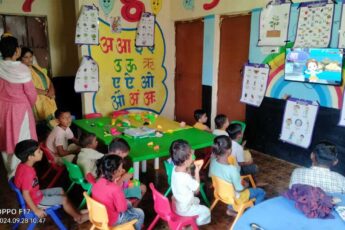Quality Matters: Why Providing Equal Access To Foundational Learning Is Only Step 1

Early Childhood Care and Development or ECCE.
This term has gained much attention across India, a country that has long since taken strides to bolster early development with world-famous schemes like the ICDS scheme, and more. The NEP 2020’s focus on bringing early childhood education into the formal schooling framework serves to support such schemes, and revive interest in ECCE. While the focus is on providing equal access to early childhood education across the nation’s grassroots, this is only the first step towards becoming a literate India. What we need is equal access to quality early education.
Global and national organisations both heed this fact; renowned children’s social welfare organisation, the United Nations Children’s Fund (UNICEF), always prefaces the word education with ‘quality’ across their policy documents and resources.
This, however, begs the question…
How Do We Define ‘Quality’ In ECCE?
This definition differs from country to country, and even across the stakeholder groups, depending on values, socio-economic context, and more. Research has tended to use structural or process dimensions, or both, to gauge the quality of preschool programmes (Lamb, 1998).
*Structural measures refer to staff–child ratios, staff qualifications, teaching experience and stability, health and safety factors, and the physical setting. Process measures include the quality of interactions between staff and children. These measures are then related to favourable child outcomes.
Low-quality Programs Hinder Progress
The research is clear; early experiences have a longstanding impact on children. To summarize, all brain development depends on what we have experienced before. All our neural pathways are formed as a result of repeated actions, and occur from the bottom up. These early experiences shape our learning capacities, our behaviours, and even our physical and mental health. When these early experiences — of which early education is majorly responsible for — are not supported by an adequate quality of ECCE, we risk our children’s future.
Square Panda India Recommends: How We Go About Implementing Quality In ECCE
- Trained ECCE stakeholders: There is strong evidence that enriched stimulating environments and high-quality pedagogy are fostered by better qualified staff, and better quality pedagogy leads to better learning outcomes (Litjens and Taguma, 2010). This suggests well-trained and well-educated adults are key to providing high-quality early educational programs for favourable child development. However, training is simply one factor that impacts child outcomes. It is the ability of the trained adult to create a holistic learning atmosphere and pedagogical environment that makes a difference in quality. This includes:
– A good understanding of ECCE
– Knowledge of how an early brain develops, and how early experiences impact learning
– Supporting resources (like tools, infrastructure, and a strong early learning community) to reduce burden on educators and Anganwadi workers
- Content Backed By Early Childhood Research: Global research is clear; not only are the early years crucial to children’s development, but they also need to be supported by a stimulating and enriching environment. For a well-rounded development in these early years, ECCE programs need to include quality content that is based on the latest learnings in early childhood research. This curriculum needs to take into account the entire ecosystem that comes into play when a child begins to learn, and integrate multiple crucial components of early development into the programs.
Read more about Square Panda’s research into neuroscience and the early learner.
- Measurable Outcomes: While driving up the accessibility to early education is a noble cause, attention must be taken to ensure high quality programs reach India’s children. Data from multiple countries share a cautionary note; evidence from high-, middle- and low-income countries alike demonstrates that even when access goes up, children’s outcomes do not always improve (e.g. Wong et al., 2013). Measurement is the only way to gauge if our early learning programs are having the required impact on children’s development. We can track outcomes at scale across the entire early learning landscape, customising the indicators of development as per each state. The data derived can then be used for actionable insights and corrective actions.
As innovators of high-quality ECCE programs ourselves, we are uniquely positioned to partner with multiple stakeholders at different levels of India’s early learning landscape. Learn more about us and our NEP 2020-aligned programs at ecce.squarepanda.in.
*To view our approach to implementing our foundational learning and educator empowerment programs, read this article.




Leave a Comment